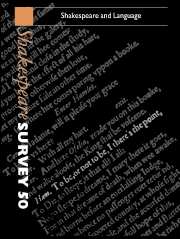Book contents
- Frontmatter
- Shakespeare’s Language and the Language of Shakespeare’s Time
- ‘I’ll plague thee for that word’: Language, Performance, and Communicable Disease
- The Language of the Spectator
- Marlowe’s Edward II: Penetrating Language in Shakespeare’s Richard II
- Hamlet’s Ear
- Secrecy and Gossip in Twelfth Night
- Shakespeare Rewriting Ovid: Olivia’s Interview with Viola and the Narcissus Myth
- ‘Voice Potential’: Language and Symbolic Capital in Othello
- Household Words: Macbeth and the Failure of Spectacle
- Erring and Straying Like Lost Sheep: The Winter’s Tale and The Comedy of Errors
- The ‘Shakespearian Gap’ in French
- Reading the Early Modern Text
- Shakespeare and the Metamorphosis of the Pentameter
- Rereading Illustrations of the English Stage
- Nietzsche’s Hamlet
- ‘Strange and woonderfull syghts’: The Tempest and the Discourses of Monstrosity
- Shakespeare Performances in England, 1996
- Professional Shakespeare Productions in the British Isles, January–December 1995
- 1 Critical Studies
- 2 Shakespeare’s Life, Times, and Stage
- 3 Editions and Textual Studies
- Books Received
- Index
Shakespeare’s Language and the Language of Shakespeare’s Time
Published online by Cambridge University Press: 28 March 2007
- Frontmatter
- Shakespeare’s Language and the Language of Shakespeare’s Time
- ‘I’ll plague thee for that word’: Language, Performance, and Communicable Disease
- The Language of the Spectator
- Marlowe’s Edward II: Penetrating Language in Shakespeare’s Richard II
- Hamlet’s Ear
- Secrecy and Gossip in Twelfth Night
- Shakespeare Rewriting Ovid: Olivia’s Interview with Viola and the Narcissus Myth
- ‘Voice Potential’: Language and Symbolic Capital in Othello
- Household Words: Macbeth and the Failure of Spectacle
- Erring and Straying Like Lost Sheep: The Winter’s Tale and The Comedy of Errors
- The ‘Shakespearian Gap’ in French
- Reading the Early Modern Text
- Shakespeare and the Metamorphosis of the Pentameter
- Rereading Illustrations of the English Stage
- Nietzsche’s Hamlet
- ‘Strange and woonderfull syghts’: The Tempest and the Discourses of Monstrosity
- Shakespeare Performances in England, 1996
- Professional Shakespeare Productions in the British Isles, January–December 1995
- 1 Critical Studies
- 2 Shakespeare’s Life, Times, and Stage
- 3 Editions and Textual Studies
- Books Received
- Index
Summary
'Many things are true which only the commonest minds observe.'
'Then I think the commonest minds must be rather useful.'
Middlemarch, Book I, chapter 5Shakespeare is our most underrated poet. It should not be necessary to say that, but it is. We generally acknowledge Shakespeare's poetic superiority to other candidates for greatest poet in English, but doing that is comparable to saying that King Kong is bigger than other monkeys. The difference between Shakespeare's abilities with language and those even of Milton, Chaucer, or Ben Jonson is immense. The densities- of his harmonies - phonic and ideational both - are beyond comfortable calculation, are so great that the act of analysing them is self-defeating, uncovers nests of coherence that make the physics of analysed lines less rather than more comprehensible.
The reason it is necessary to point out Shakespeare's poetic superiority to competing poets is, I think, that we have so long, so industriously ignored the qualities in literature that drew us to it in the first place. As a result, we - or, at any rate, the scholarly books and essays we write and read - and our students treat a Shakespeare play or Paradise Lost or Huckleberry Finn or even 'Kubla Khan' as if we valued it for its paraphrasable content or as a source of information about the time and society that spawned it or about its author. When I talk about what 'we' do, I speak not just of the 'us' of the last several years of sociology, sentimental anthropology, and crusading sanctimony in literary criticism but of the cultural residue of a trend that goes back in Western culture at least to Horace and Philip Sidney and their intellectually casual conclusion that value in literature resides in its supposed, rarely witnessed capacity as an agent of moral improvement.
- Type
- Chapter
- Information
- Shakespeare Survey , pp. 1 - 18Publisher: Cambridge University PressPrint publication year: 1997

